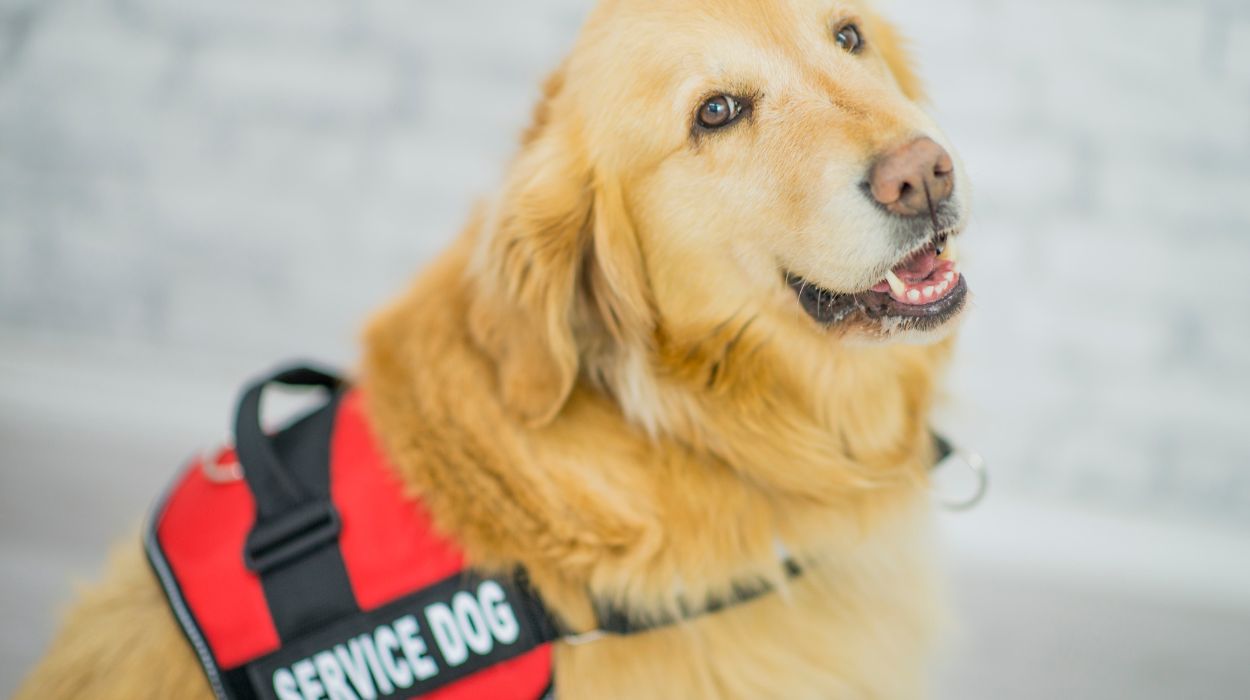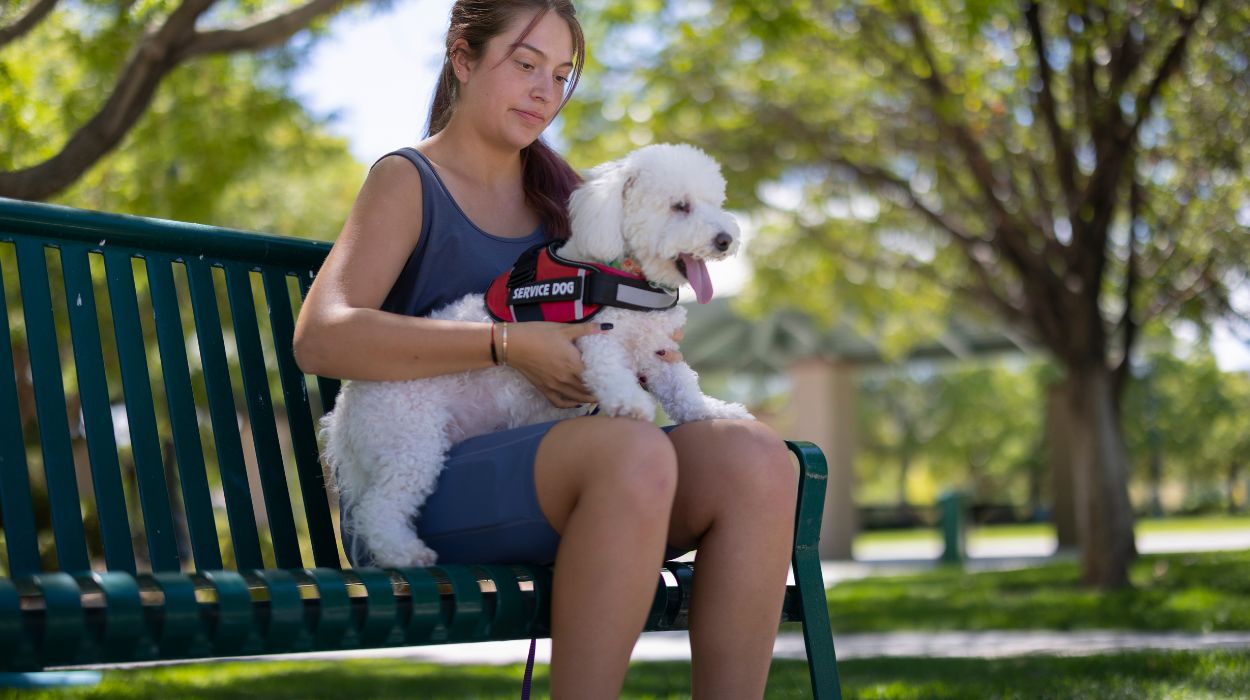 Expert's opinion
Expert's opinion
Expert's opinion
The article is a subjective view on this topic written by writers specializing in medical writing.
It may reflect on a personal journey surrounding struggles with an illness or medical condition, involve product comparisons, diet considerations, or other health-related opinions.
Although the view is entirely that of the writer, it is based on academic experiences and scientific research they have conducted; it is fact-checked by a team of degreed medical experts, and validated by sources attached to the article.
The numbers in parenthesis (1,2,3) will take you to clickable links to related scientific papers.
Getting The Best Anxiety Service Dog for Your Mental Health 2024

Living with anxiety often interferes with life. It causes constant worry, overwhelming fear, and panic attacks for even the simplest task.
Affected individuals can get a service dog to lessen their anxiety and help them live a better life. These remarkable canines are trained to provide emotional and practical assistance.
The highly trained dogs can sense and respond to their owner’s anxiety-related symptoms. Service dogs also offer several benefits. This article explores the numerous advantages of having an anxiety service dog. You will also discover why getting one for yourself might be life-changing.
Whether you’re considering getting an emotional support animal for yourself or a loved one, understanding their potential positive impact is crucial. This will provide comfort, stability, and renewed confidence to anxious individuals.
Do Pets Really Help With Anxiety?
Yes, a service animal can indeed help with anxiety. Numerous studies and anecdotal evidence suggest that interacting with psychiatric service dogs can positively impact mental health.
They are ideal for dog owners that are diagnosed with depression, bipolar disorder, post-traumatic stress disorder, etc[1].
Service animals are also known to help reduce stress levels. They provide companionship and emotional support, so spending time with pets can create a sense of comfort. Pets can also help alleviate the feeling of loneliness, which is a common trigger for anxiety.
How Can Service Dogs Help with Anxiety?
Service dogs can help in managing anxiety disorder through the following ways.
Alerting And Interrupting
Therapy dogs can be trained to interrupt anxious behaviors by nudging, licking, or providing deep pressure therapy. This can help redirect the individual’s focus and provide a calming effect.
Deep Pressure Therapy
Many service animals are trained to provide deep pressure therapy by leaning or applying gentle pressure on their owner’s body during distress.
If you are not getting a young service animal, learn how to adopt an emotional support dog. Thus, choosing a service dog that has passed the necessary training is necessary.
Providing A Sense Of Security
The presence of a service animal can offer a sense of security and reassurance to individuals with anxiety. Knowing their psychiatric service dogs are well-trained can significantly alleviate stress, particularly in public or unfamiliar environments.
What Are Service Dogs?

Service animals are specially trained to provide assistance and support to individuals with mental health conditions. They undergo extensive training to perform tasks that help mitigate the effects of the person’s physical or mental health.
The therapy dog’s training process involves obedience, socialization, and task-specific training. This ensures that the trained dog is reliable, well-behaved, and capable of performing the necessary tasks.
Companion animals also have legal protection and public access rights in many countries. This means they are involved in their handlers day to day lives such as visiting restaurants, stores, airports, and other establishments.
According to the U.S. Department of Justice Civil Rights Division, service animals can accompany people[2] with physical disabilities to all public areas.
On the other hand, some countries may require you to provide legitimate service animal certification. This helps to confirm you are responsible enough to take care of therapy dogs.
Benefits Of Anxiety Service Dogs
Below are the key benefits of having anxiety service animals:

Reduces Anxiety Symptoms
Specially trained service animals can detect signs of panic or anxiety attack before they escalate and provide early warnings to individuals. This helps concerned individuals to take the necessary steps to manage their mental illness effectively[3], including those suffering from post traumatic stress disorder.
People with obsessive compulsive disorder (OCD) may also suffer intrusive thoughts that can cause an anxiety attack or interfere with their lifestyle. In this case, you need an OCD service dog to help handle unwanted thoughts, images, urges, or obsessions.
Emotional Support
The presence of a psychiatric service dog has a calming effect on people. Their calm demeanor and the release of oxytocin (the “feel-good” hormone)[4] during interactions assist people with bipolar disorder.
Petting or stroking the dog can also have a therapeutic effect, promoting relaxation and reducing stress. You can check the best legitimate ESA for dogs specifically trained to provide emotional support for people with disabilities.
Improves Social Interaction
Individuals with anxiety disorders often struggle with social interactions and may feel isolated or uncomfortable in public settings.
Psychiatric service dogs can serve as a bridge, helping to initiate social interactions and reduce panic attacks. Their presence can act as a conversation starter and provide a topic of discussion, leading to increased social connections and opportunities.
Distraction And Redirection
When faced with anxiety-inducing situations, an emotional support animal can divert one’s focus away from the anxiety triggers. They can engage people in playful activities or provide physical contact.
Psychiatric service dogs may use grounding cues, such as pawing, nudging, or licking, to bring one back to the present. This redirection of focus helps break the cycle of anxiety and promotes a sense of calm.
How To Get A Service Dog For Anxiety

Here is a general guide on how to get a service dog for depression and anxiety:
- Assess your need: Consider the impact of your anxiety on your daily life and whether emotional support animals could provide substantial assistance and support.
- Consult a healthcare professional: Speak with a doctor, therapist, or psychiatrist.
They can provide guidance, assess your condition, and provide any necessary documentation or recommendations. For example, here is the documentation for getting an emotional support animal in North Carolina[5].
- Research service dog organizations: Look for reputable service dog organizations specializing in training and providing service dogs for individuals with mental health conditions.
Each service dog organization may have different eligibility criteria. However, you’ll need to demonstrate that you have a legitimate need for a trained service dog due to your anxiety attack.
You may also check Certapet review pages for the best service for getting confidential and fast ESA letters.
- Apply and undergo evaluation: Apply to the service dog organization of your choice. The organization may require detailed information about your anxiety diagnosis, treatment history, living situation, and lifestyle.
- Financial considerations: Research the costs involved, including the dog’s initial training, ongoing care, veterinary expenses, and any required equipment or supplies.
- Training and placement: If accepted into a service dog program, you will undergo a training process. During this period, you’ll learn how to work with the service dog, reinforce their training, and develop a strong bond.
- Graduation and ongoing support: Once you and the service dog have completed the training program, the organization may provide ongoing support, guidance, and resources.
How Much Does a Service Dog Cost?
The cost of a service dog depends on various factors, including the organization you obtain the dog from. Other factors that may alter cost include; the dog’s breed and training, specific tasks, and skills required for your needs.
For instance, some service dog organizations breed and raise their own dogs, ensuring they have the appropriate temperament for service work. This involves costs associated with responsible breeding practices, veterinary care, and the upbringing of the puppies.
Organizations may also obtain dogs from shelters or rescue groups, which can be more cost-effective than regular companion dogs[6]. Some countries provide support for individuals who need a service dog for emotional or mental support but lack the finances to pay for it.
You can inquire about how to get a free service dog for anxiety where you live.. Additionally, ongoing supplies like food, grooming, toys, and training treats should be factored into the overall cost.
Service dogs also require regular veterinary check-ups, vaccinations, and preventive care. These costs include initial health screenings, vaccinations, spaying or neutering, and ongoing medical expenses throughout the dog’s life.
Conclusion
Getting a service dog is essential for individuals suffering from anxiety attacks. They provide emotional support and help individuals communicate or relate better with society. You should also speak to a medical professional for specific recommendations to address your mental disability.
Frequently Asked Questions
Before getting an anxiety service dog, conduct thorough research about the organization. Choose professional dog trainers with a good reputation, positive reviews, and a strong track record for training a psychiatric service dog.
No, emotional support animals are not inherently dangerous. They are trained extensively to be well-behaved, obedient, and reliable in performing tasks and assisting people.
The costs of caring for service dogs differ, depending on the dog’s size, breed, health, and specific needs. For instance, monthly expenses for dog food can range from $20 to $60 or more.
Emotional support animals can only provide emotional support for individuals with depression; they are not a cure for it.
Depression is a complex mental health condition that requires different approaches to treatment, including therapy, medication, lifestyle changes, and support systems.
Yes, emotional support animals are generally friendly and well-socialized. They are selected and trained for their temperament, which includes being friendly, patient, and calm.
It’s generally recommended to consult with a professional dog trainer to ensure that your dog’s dietary needs are met. However, ensure that your dog’s diet balances proteins, carbohydrates, and healthy fats properly.
If you encounter an aggressive service dog in a public setting and feel it is dangerous to yourself or others, report it to the appropriate authorities.
Yes, anxiety service dogs can also be beneficial for children who experience an anxiety disorder.
+ 6 sources
Health Canal avoids using tertiary references. We have strict sourcing guidelines and rely on peer-reviewed studies, academic researches from medical associations and institutions. To ensure the accuracy of articles in Health Canal, you can read more about the editorial process here
- Lloyd, J., Johnston, L. and Lewis, J.B. (2019). Psychiatric Assistance Dog Use for People Living With Mental Health Disorders. [online] 6. doi:https://doi.org/10.3389/fvets.2019.00166.
- ADA.gov. (2023). ADA Requirements: Service Animals. [online] Available at: https://www.ada.gov/resources/service-animals-2010-requirements/.
- Va.gov. (2014). VA.gov | Veterans Affairs. [online] Available at: https://www.ptsd.va.gov/gethelp/dogs_ptsd.asp.
- Miller, S.C., Kennedy, C.C., DeVoe, D.C. and Kogan, L.R. (2009). An Examination of Changes in Oxytocin Levels in Men and Women Before and After Interaction With a Bonded Dog. [online] ResearchGate. Available at: https://www.researchgate.net/publication/233581989_An_Examination_of_Changes_in_Oxytocin_Levels_in_Men_and_Women_Before_and_After_Interaction_With_a_Bonded_Dog.
- Ncdhhs.gov. (2019). NC DHHS: Registration Application Of Service Animal For People With Disabilities. [online] Available at: https://www.ncdhhs.gov/divisions/vocational-rehabilitation-services/independent-living-people-disabilities/service-animals-people-disabilities.
- Lundqvist, M., Alwin, J. and Levin, L.-Å. (2019). Certified service dogs – A cost-effectiveness analysis appraisal. [online] doi:https://doi.org/10.1371/journal.pone.0219911.



